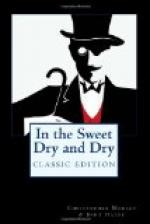This line of argument might perhaps have been powerful if adopted earlier, but by that time the agreeable vision of Bleak’s ascetic features wreathed in a faintly spiritual benignance was already firmly fixed in the public imagination. The little celluloid button showing his transfigured and endearing smile was worn on millions of lapels. As one walked down the street one met that little badge hundreds of times, and the mere repetition of the tenderly exhilarated face seemed to many a citizen a beautiful and significant thing. Men are altruistic at heart. They saw that Bleak would make of this high office a richly eloquent and appealing stewardship. They were reconciled to their own abstinence in the thought that the dreams and desires of their own hearts would be so nobly fulfilled by him. Alcohol was gone forever, and perhaps it was as well. They themselves were conscious of having abused its sacred powers. But now, in the person of this chosen representative, all that was lovely and laughable in the old customs would be consecrated and enshrined forever. Men who had known Bleak in the days of his employment on the Balloon recollected that even during the cares and efforts of his profession little incidents had occurred that might have shown (had they been shrewd enough to notice) how faithfully he was preparing himself for the great responsibility destiny held concealed.
The day of the election was declared a national festival. The Chuff government, a good deal startled by the universal seriousness and enthusiasm shown in the enrollment at the primaries, was disposed (in secret) to regard the office of Perpetual Souse as a helpful compromise on a vexed question. The war against Nature had been only partially successful: indeed the chuff chief-of-staff declared that Nature had not learned her lesson yet, and that some irreconcilable berries and fruits were still waging a guerilla fermentation, thus rupturing the armistice terms. The countryside had been ravaged, all the Chautauqua lecturers were hoarse, industry was at a standstill, misery and despair were widespread. Even the indomitable Chuff himself was a little nonplussed. Better (he thought) one man indubitably, decorously, publicly, and legally drunk, than millions of citizens privily attempting to cajole raisins and apples into illicit sprightliness.
The citizens went to the polls in a mood of exalted self-denial. They knew that they were voting away their own rights, but they also knew that their private ideals would be more than realized in the legalized frenzy of their representative. Bleak, appearing on the balcony of his hotel, smiled affectionately on the loyal faces that cheered him from below. He was deeply moved. To Quimbleton (who was supporting him from behind) he said: “Their generosity is wonderful. I shall try to be worthy of their confidence. I hope I may have strength to put into practice the frustrated desires of these noble people.”




